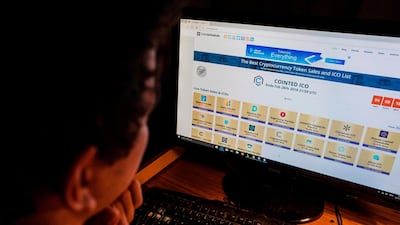The UAE's Securities and Commodities Authority has approved initial coin offerings as securities and will work with the Abu Dhabi and Dubai stock exchanges to develop dedicated trading platforms. The plan is to introduce regulations by mid-2019.
What are ICOs?
ICOs are the cryptocurrency version of an initial public offering, where companies go public and sell shares to individual investors. With ICOs, investors buy units of a cryptocurrency and receive tokens instead of shares.
ICOs can be a source of capital for start-ups or small- to medium-sized enterprises. Companies can issue crypto-tokens to investors the same way shares are issued in an IPO of an equity. The first cryptocurrency distributed by an ICO was Ripple in 2013.
So far, the majority of ICOs have been used to fund fund the development of new cryptocurrencies.
Who does it help?
ICOs offer a way of crowdfunding to SMEs, other than internet-based platforms such as Kickstarter or venture capital fundraising. Coin offerings raised $3.3 billion (Dh12bn) through 412 projects in the first quarter of 2018, according to ICO Rating, a global ratings agency for the cryptocurrency market. However, only half of ICO projects were able to raise more than $100,000.
_______________
Read more:
Dubai's Avanza Innovations to tap Nordic and Far East markets in 2019
Quicktake: Blockchain set to change the public and private sectors
_______________
What is the UAE doing with ICOs?
Dubai tech company Avanza Innovations has announced it is planning to open operations in Nordic countries and the Far East by issuing an ICO in the first quarter of 2019 to fund its expansion.
The SCA's initiative to regulate ICOs has added it to the expanding list of global regulators that have decided to standardise ICOs and cryptocurrencies.
Japan's Financial Services Agency is screening the cryptocurrency exchanges before registration to ensure they do not pose an outsize risk as compared to other investment vehicles. New York State Department of Financial Services is issuing BitLicence to companies who want to operate in virtual currencies. The European Union has brought cryptocurrency exchanges and custodian wallet providers under the umbrella of anti-money laundering rules.


